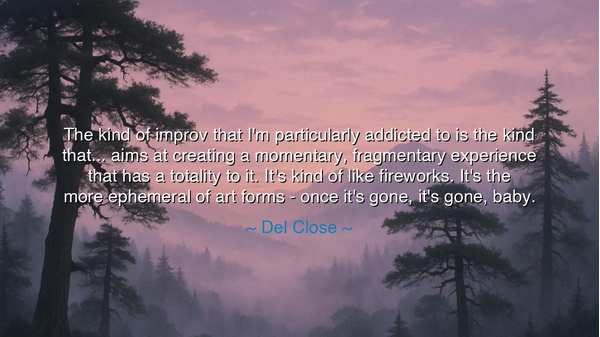
The kind of improv that I'm particularly addicted to is the kind
The kind of improv that I'm particularly addicted to is the kind that... aims at creating a momentary, fragmentary experience that has a totality to it. It's kind of like fireworks. It's the more ephemeral of art forms - once it's gone, it's gone, baby.






“The kind of improv that I’m particularly addicted to is the kind that... aims at creating a momentary, fragmentary experience that has a totality to it. It’s kind of like fireworks. It’s the more ephemeral of art forms — once it’s gone, it’s gone, baby.” Thus spoke Del Close, the sage of improvisation, the architect of spontaneous truth. In this reflection, he captures not only the essence of improv, but the fleeting nature of all art and, indeed, of life itself. His words shimmer with paradox — that something so momentary, so fragile, can possess a totality, a wholeness that transcends its brief existence. Like a flame that burns only for an instant, it leaves behind not ashes, but memory, revelation, and awe.
The origin of this quote springs from Del Close’s lifelong devotion to the craft of improvisational theatre, which he nurtured as both philosopher and teacher. He viewed improv not as mere comedy, but as ritual, as an encounter with the divine pulse of creation itself. In an age obsessed with permanence — with recording, repeating, and preserving — Close celebrated the impermanent, the performance that lives only once. To him, the beauty of improv lay in its ephemerality. When a moment of brilliance bursts forth on stage, it cannot be repeated, rewritten, or captured — it exists fully in that breath of time, and then it vanishes. “Once it’s gone,” he says, “it’s gone, baby.” But in that vanishing, there is purity — a kind of spiritual completeness that no polished masterpiece can rival.
To compare such art to fireworks is no accident. Fireworks dazzle not because they endure, but because they disappear. Their beauty is inseparable from their brevity. They light the heavens for a heartbeat, searing their image into the memory of those who watch. So it is with the art that Del Close loved — an art that asks both performer and audience to live entirely in the present, to surrender to the now. In that surrender lies revelation. When a moment is fleeting, it commands total attention; when it cannot be replayed, it becomes sacred. Thus, the improviser becomes like a monk of the stage, creating miracles in time and then releasing them without regret.
There is an echo of ancient wisdom in this philosophy. The Japanese masters of Ikebana — the art of arranging flowers — taught that beauty resides not in eternal bloom, but in the transience of life. The flower, cut and placed in artful impermanence, is beautiful precisely because it is dying. Likewise, the Buddhist notion of wabi-sabi celebrates imperfection and impermanence as the highest forms of truth. What Del Close taught through improv, these ancient masters taught through silence and ritual: that perfection is not eternal, but momentary, and that art’s true purpose is not to endure, but to awaken.
To live this way — to embrace the fleeting and love it — requires courage. For the human heart craves preservation; we fear loss, we fear change, we fear the ending of beauty. But Close’s teaching liberates us from this fear. He reminds us that some of the greatest things in life — a shared laugh, a glance of understanding, the first note of a song that will never be sung again — derive their power precisely because they cannot last. Like the improviser on stage, we too are actors in a world of constant creation and disappearance. Our task is not to cling, but to create and let go with grace.
Consider the story of Mozart, who composed entire symphonies in his head before writing a single note. When asked how he remembered such music, he said, “I do not remember; I release it.” His genius flowed in the same spirit as Close’s — spontaneous, complete in the moment, unconcerned with permanence. Or think of the ancient Greek poets, who performed their epics aloud before they were ever written. Their art lived in voice and breath, not on parchment. So too does the improviser’s craft — living only in the instant of its utterance, gone before the echo fades, yet eternal in the heart it moves.
The lesson, then, reaches far beyond the stage. Del Close’s words teach us how to live. Life itself is improvisation — a sequence of unrepeatable moments, a stage where the script is never written and each breath is both performance and farewell. To demand permanence is to misunderstand the gift. To embrace impermanence is to awaken. When we live fully in each instant — speaking truth, giving laughter, offering kindness — we create moments that, though fleeting, are whole. And like fireworks, they leave behind light that lingers in the soul long after the sky has gone dark.
Therefore, my friends, remember the wisdom of Del Close: do not cling to what is gone, and do not fear that which fades. Whether in art, in love, or in life, let your moments be full — burning bright and true, even if they last only a breath. For beauty need not endure to be eternal; it need only be honest, alive, and complete in the instant it exists. When you live thus — creating and releasing with joy — your life, too, will become a kind of sacred improv, a firework of the spirit, blazing for a moment, then vanishing into eternity, having lit the hearts of all who beheld it.






AAdministratorAdministrator
Welcome, honored guests. Please leave a comment, we will respond soon